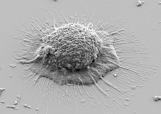
Physikalisches Institut, Westfälische Wilhelms-Universität Münster and Center for Nanotechnology (CeNTech), D-48149 Münster, Germany
e-mail: fuchsh@uni-muenster.de
URL: http://www.uni-muenster.de/Physik/PI/Fuchs
http://www.centech.de

 |
Harald Fuchs
Physikalisches Institut, Westfälische Wilhelms-Universität Münster and Center for Nanotechnology (CeNTech), D-48149 Münster, Germany e-mail: fuchsh@uni-muenster.de URL: http://www.uni-muenster.de/Physik/PI/Fuchs |
 |
Nanoscale Science is strongly driven by Scanning Probe Techniques which allow us to investigate and manipulate individual molecules, thus complementing electron- and ion beam techniques as well as laser spectroscopy.
While the imaging capabilities of techniques such as STM, SFM, SNOM etc. dominated the application of these methods at their early development stages, the physics of probe-sample interactions, and the quantitative analysis of elastic, electronic and magnetic surface and transport properties became recently of increasing interest. Force spectroscopy allows us to gain information about folding and unfolding processes of individual protein molecules and other biologically relevant systems. Novel high resolution Near Field Optics enables us to inspect structures and transport phenomena even in living, i.e. biological active systems. Learning from biology, we may find new strategies to design and build up complex self organized systems which do not exist in nature. On this basis also novel synthetic 'bio-inspired' functional materials and systems may be developed.